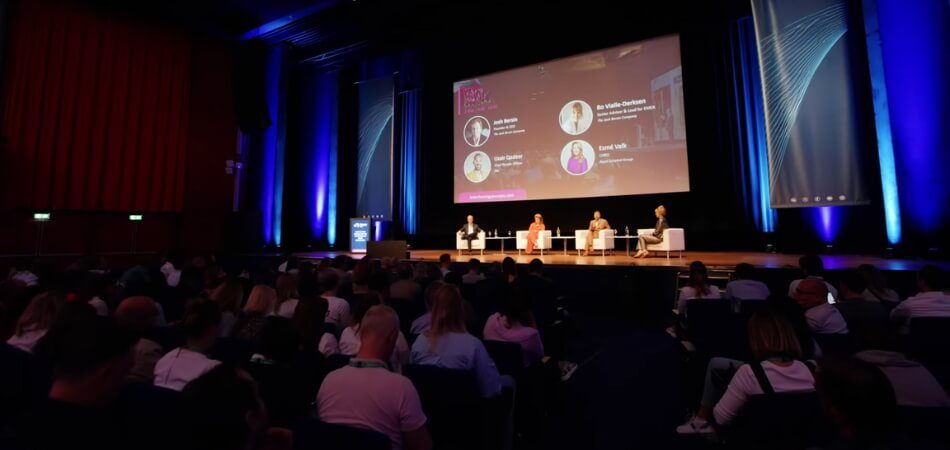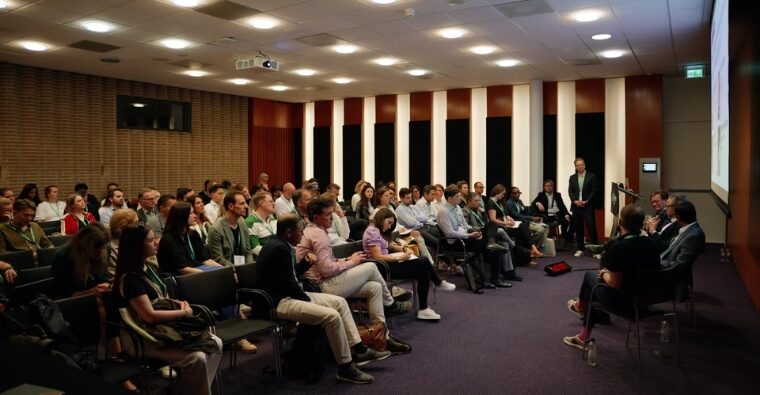Business conferences have always been key platforms for networking, learning, and sharing ideas. However, the way these conferences are organized and attended is constantly changing. With new technologies and shifting preferences, attendees and organizers alike are adapting to fresh trends shaping the future of business events.
So, what are the top trends in business conferences? Hybrid events, virtual networking, and personalized experiences are just a few of the leading trends making conferences more engaging and accessible in 2024 and beyond.
If you’re curious about how these trends are transforming business events, keep reading to discover what’s driving the evolution of conferences and how you can make the most of them.
What is the Importance of Trends in Business Conferences?
Staying up to date with trends in business conferences is essential for both organizers and attendees. Trends reflect changes in technology, preferences, and the way people interact, making conferences more relevant and engaging. Here are some key reasons why knowing trends in business conferences is so important.
Increased Engagement
Trends like interactive sessions, virtual networking, and hybrid models make conferences more engaging. Attendees no longer passively listen but actively participate through polls, Q&A sessions, and live discussions, leading to a more fulfilling experience.
Wider Accessibility
Trends such as hybrid and virtual conferences enable global participation. This means that more people can attend without the need for travel, making conferences accessible to a broader audience, regardless of location.
Improved Networking Opportunities
With the rise of virtual networking tools and matchmaking algorithms, attendees can now connect with the right people more efficiently. This trend allows for more meaningful connections and long-lasting professional relationships, even beyond the event.
Cost-Effectiveness
Trends that incorporate digital solutions help reduce the costs associated with hosting or attending conferences. Virtual and hybrid events cut down on travel, accommodation, and venue costs, allowing organizations to focus more on content and quality.
Sustainability
Eco-friendly trends are shaping the future of conferences. From reducing waste to encouraging virtual attendance, sustainable practices are becoming increasingly important for organizers who want to minimize their environmental impact.
By keeping up with what are the top trends in business conferences, businesses can create more effective events, engage their audience better, and remain competitive in their industries.
What Are the Top Trends in Business Conferences for 2024 and Beyond?
Business conferences are continuously evolving to meet the demands of a changing world. As we move into 2024 and beyond, new trends are emerging that reshape the way these events are organized and experienced. Let’s dive into the top trends you should know.
Hybrid Events
Hybrid events, combining in-person and virtual elements, continue to gain traction. This format allows attendees to join from anywhere, offering flexibility and wider reach. It also enables conference organizers to offer services to both local and global audiences, creating a more inclusive experience.
Personalized Experiences
Attendees are no longer satisfied with generic content. Conferences are increasingly using data to offer personalized agendas, targeted networking opportunities, and customized content. This personalization improves attendee engagement, ensuring that everyone walks away with relevant insights and connections.
Sustainability
Sustainability is more than a buzzword; it’s becoming a core part of event planning. Eco-friendly practices include reducing waste, using digital materials instead of printed ones, and promoting sustainable travel. For example, an International Business Conference in Canada could reduce its carbon footprint by offering virtual attendance options.
Artificial Intelligence (AI)
AI is transforming business conferences by offering enhanced matchmaking for networking, automating event registration, and even curating content based on attendees’ preferences. AI-powered chatbots are also being used to assist attendees in real time, making the event experience smoother and more engaging.
Virtual Networking
With the rise of digital platforms, virtual networking is a trend that’s here to stay. Attendees can now connect with industry professionals from around the world without being physically present. Virtual networking rooms, AI-powered matchups, and one-on-one virtual meetings are making it easier to form meaningful connections.
Wellness Initiatives
Conferences are increasingly integrating wellness programs into their agendas. From meditation sessions to physical activities like yoga, these initiatives help attendees recharge during long days of sessions and networking. A focus on wellness ensures that attendees remain energized and engaged throughout the event.
Immersive Technologies
The use of immersive technologies such as virtual reality (VR) and augmented reality (AR) is improving the conference experience. These tools provide interactive ways for attendees to engage with content, presentations, and even virtual booths, offering a more dynamic and memorable experience.
So, the trends shaping business conferences in 2024 and beyond are all about flexibility, personalization, sustainability, and tech integration. By staying on top of these trends, you can ensure that your conference experiences are both innovative and impactful.
Why Are Hybrid Business Conferences Growing in Popularity?
Hybrid business conferences are becoming the go-to format for many organizations, blending the best of both in-person and virtual experiences. This format provides flexibility for attendees and offers unique benefits that have contributed to its rising popularity. Here are the top reasons why hybrid business conferences are gaining traction.
Increased Accessibility
Hybrid events allow people from different parts of the world to participate without the need for travel. This makes conferences more inclusive, enabling professionals who may face logistical or financial barriers to join virtually.
Cost-Effectiveness
For both organizers and attendees, hybrid conferences are cost-effective. Organizers can save on venue costs while attendees can avoid travel and accommodation expenses, making it more affordable without compromising on quality.
Wider Audience Reach
The hybrid model allows for larger audiences by removing geographical limitations. This enables organizers to engage a global audience, increasing the reach and impact of their event.
Increased Engagement
Interactive tools such as live polling, virtual Q&A sessions, and breakout rooms help keep both virtual and in-person attendees engaged. This leads to better participation and makes the event more dynamic.
Data-Driven Insights
With virtual platforms, organizers can easily collect data on attendee behavior, preferences, and engagement. This helps in refining future events and delivering more tailored experiences.
Environmental Impact
Hybrid events support sustainability efforts by reducing travel-related carbon footprints. This eco-friendly approach is increasingly important to both businesses and attendees who prioritize green practices.
The hybrid conference model is proving to be a flexible, scalable, and future-forward solution for business events, making it a popular choice for many organizations today.
What Are the Different Types of Business Conferences?
Business conferences come in many forms, each designed to meet specific goals and audiences. Whether you’re looking to showcase products, learn from experts, or expand your network, Being aware of the different types of business conferences can help you make the right choice for your needs.
Trade Shows
Trade shows are large-scale events where companies exhibit their products and services. They are great for businesses seeking to showcase innovations, generate leads, and build brand awareness. Trade shows usually feature exhibition booths and offer valuable networking opportunities with industry professionals.
Workshops and Seminars
Workshops and seminars are smaller, focused gatherings designed to provide hands-on learning. They often feature experts in specific fields who lead in-depth sessions. These events are ideal for those looking to acquire new skills or delve deeper into particular topics.
Networking Conferences
As the name suggests, networking conferences focus on building professional relationships. They are structured to maximize interactions between attendees, often including one-on-one meetings, mixers, and casual social events. These conferences are perfect for anyone looking to expand their business contacts.
Industry-Specific Conferences
Industry-specific conferences cater to professionals in a particular sector. These events provide insights into the latest trends, challenges, and opportunities in the industry, offering specialized content relevant to attendees’ interests and professions.
Academic and Professional Conferences
These conferences focus on the presentation of research and academic papers. They attract scholars, researchers, and professionals interested in the latest developments and ideas within their fields.
Choosing the right type of business conference depends on your objectives, whether it’s showcasing your brand, learning new skills, or making meaningful connections.
How Virtual Networking Is Changing Business Conferences?
Virtual networking has revolutionized how we connect at business conferences. It removes geographical barriers and makes it easier for attendees to engage with one another from anywhere in the world. Here are some key ways in which virtual networking is changing business conferences.
Global Connections
Virtual networking allows attendees to connect with professionals from all over the world without having to travel. This opens up opportunities for building international relationships and expanding professional networks beyond local or regional limits.
Matchmaking Algorithms
Many virtual platforms use matchmaking algorithms to pair attendees based on shared interests or industries. This helps make networking more efficient by connecting individuals with relevant contacts, ensuring more meaningful conversations and collaborations.
Flexible Networking Opportunities
Unlike in-person conferences, virtual networking allows for flexible scheduling. Attendees can choose when and with whom to connect, making it easier to manage time and focus on conversations that matter most to them.
Improved Networking Tools
Virtual networking platforms offer a variety of tools like live chats, video calls, and virtual rooms. Having real-time conversations and following up immediately is easier with these features. The impact of business conferences on networking has been profound, as these tools enable more dynamic connections.
Better Accessibility
Virtual networking has made conferences more inclusive by allowing people with mobility challenges or time constraints to participate without the need for physical presence. This increases diversity in networking and allows for a broader exchange of ideas.
So, virtual networking is making business conferences more accessible, efficient, and engaging by breaking down physical barriers and offering innovative ways to connect.
How Personalization Improves Attendee Experience in Conferences?
Personalization is revolutionizing the way attendees experience conferences. By tailoring events to meet individual preferences and needs, organizers can create more engaging and impactful experiences. Here’s how personalization improves the attendee journey:
- Customized Agendas: Attendees can select sessions that align with their interests, allowing them to focus on topics that matter most to them. This ensures that each participant gets the most value from their time at the conference.
- Personalized Networking Opportunities: Using algorithms, organizers can suggest connections based on shared interests or professional backgrounds. This targeted approach makes it easier for attendees to build meaningful relationships.
- Personalized Content Delivery: Personalized content recommendations help attendees discover relevant resources, articles, and videos that enhance their learning experience. This keeps them engaged long after the conference ends.
- Interactive Polls and Feedback: Customizing sessions with live polls or Q&A allows attendees to share their thoughts and questions in real time. This interaction fosters a more dynamic and inclusive atmosphere.
- Unique Event Experiences: From custom swag to personalized welcome messages, small touches can make a big difference. These thoughtful details help attendees feel valued and create lasting memories.
- Post-Event Follow-ups: Personalized follow-up emails can provide attendees with additional resources related to the sessions they attended. This reinforces learning and keeps the conversation going.
- Increased Satisfaction and Loyalty: When attendees feel their needs are understood and met, they’re more likely to return for future events. Personalization creates a sense of community and belonging.
By taking advantage of this personalization, conference organizers can create a more engaging, satisfying experience that resonates with each attendee, leading to greater success for everyone involved.
The Future of Business Conferences: What Should You Expect?
The future of business conferences is an exciting landscape filled with innovation and adaptability. As we move forward, these events will continue to evolve, incorporating technology and new ideas to enhance the attendee experience. Here are the key expectations for the future of business conferences.
Greater Emphasis on Hybrid Formats
Hybrid conferences will dominate, allowing participants to choose between in-person and virtual attendance. This flexibility adapts to diverse needs and expands the reach of events.
Increased Networking Opportunities
Expect sophisticated networking tools that use AI to match attendees based on interests and goals. This will enable meaningful connections and make networking more efficient.
Personalized Experiences
Conferences will focus on personalizing content and sessions to individual attendees preferences. By leveraging data, organizers can create customized agendas that resonate with each participant.
Sustainable Practices
Environmental consciousness will drive conference planning. Expect more eco-friendly venues, digital materials instead of printed ones, and initiatives aimed at reducing the carbon footprint.
Integration of Advanced Technologies
Technologies like virtual reality and augmented reality will provide immersive experiences for attendees. These innovations will enable dynamic presentations and interactive workshops, upgrading engagement levels.
Focus on Wellness
Future conferences will incorporate wellness initiatives, such as mindfulness sessions and fitness breaks, acknowledging the importance of mental and physical well-being during events. This trend aims to create a healthier and more balanced experience for attendees.
As business conferences continue to adapt and develop, these trends will shape the way we connect, learn, and collaborate in the professional world. Adapting to these changes will ensure that conferences remain relevant and valuable for all participants.
Frequently Asked Questions
Here are some frequently asked questions (FAQs) about what are the top trends in business conferences. These questions reflect common inquiries people have regarding the constantly changing landscape of business events.
Are Virtual Conferences Still Relevant?
Yes, virtual conferences remain highly relevant as they provide flexibility and accessibility to attendees worldwide. Many organizations have embraced hybrid formats, combining in-person and virtual elements to cater to diverse preferences and reach a broader audience.
Will Networking Opportunities Improve in Future Conferences?
Absolutely! Future conferences will enhance networking opportunities through advanced technologies and AI tools that facilitate meaningful connections. Expect personalized matchmaking and interactive sessions that foster authentic relationships among attendees.
Are Sustainability Practices Becoming Common in Business Conferences?
Yes, sustainability practices are increasingly being integrated into business conferences. Organizers are focusing on eco-friendly venues, digital materials, and reducing waste to ensure that events align with environmental consciousness and responsibility.
Can Attendees Expect Personalized Experiences at Future Conferences?
Yes, personalization is a major trend in future conferences. Organizers are leveraging data to personalize content, sessions, and networking opportunities to individual preferences, ensuring that each attendee has a unique and valuable experience.
Is Technology Expected to Play a Bigger Role in Future Conferences?
Definitely! Advanced technologies, such as virtual reality and AI, will significantly enhance future conferences. These innovations will create immersive experiences, making sessions more engaging and interactive for attendees, and ultimately elevating the overall event experience.
Conclusive Words
As we look ahead, the future of business conferences promises to be more dynamic and engaging than ever before. Being aware of what are the top trends in business conferences is crucial for both organizers and attendees seeking to maximize their experiences.
By featuring hybrid formats, personalized content, and sustainable practices, conferences are set to offer unparalleled opportunities for learning and networking. These trends not only improve engagement but also create meaningful connections among professionals.
As you prepare for the upcoming business conferences, keep these trends in mind to ensure you make the most of your experience. Stay informed, adapt to the changes, and seize the opportunity to grow both personally and professionally.








